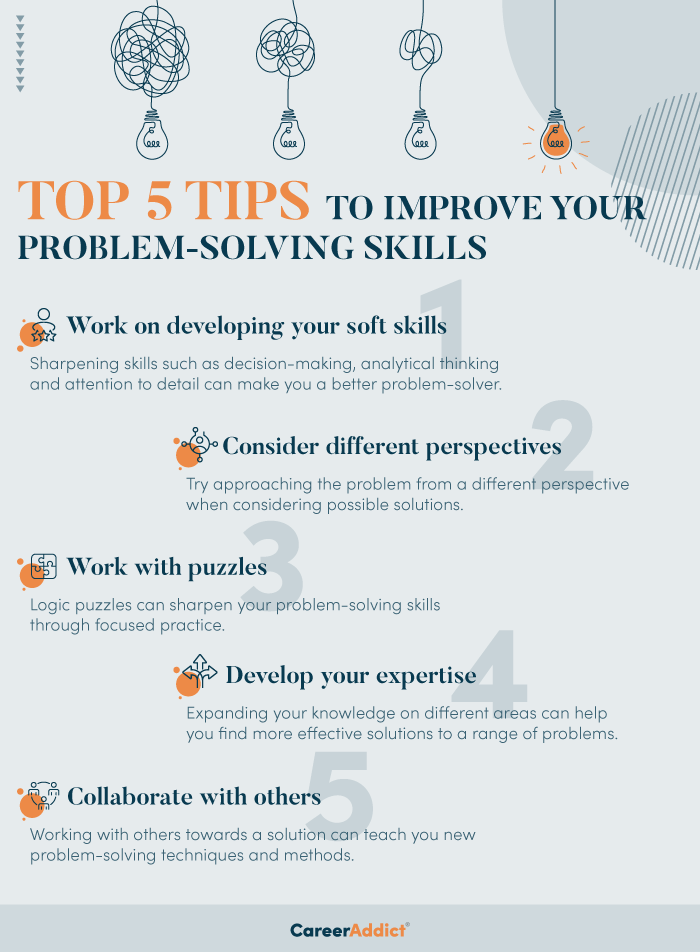Technology continues to alter the workplace, streamlining some jobs, eliminating others, and making the rest more complex. A recent World Economic Forum study found that 94% of business leaders expect their employees to accumulate new skills on the job. One of the professional skills they most covet in employees of the future is the ability to solve problems.
While computers can solve mathematical problems easily and quickly, there are numerous issues in the workplace that require human nuance. That’s where you come in, and we’ve created this handy guide to help you perfect your problem-solving skills and excel in your career.
What are problem-solving skills?
Life doesn’t always run smoothly, so it’s wise to be prepared when things inevitably go sideways. The purpose of problem-solving is to right the wrong and get things back on track. Employers particularly value your ability to solve problems in the workplace because anything that goes awry with customer service, supply chain issues, budgeting and more can dramatically affect the company’s profitability and overall success.
Solving complex problems in life or the workplace is more than just knowing the answer to a simple numerical equation. Problem-solving requires the ability to identify a problem, determine its source, find solutions and then implement them. Each of these steps is essential to achieving the desired outcome.
Problem-solving skills examples
Problem-solving requires multiple skills to get to a solution. These skills are all vital professional skills that employers desire in the immediate and future workplace.
1. Decision-making
You’ll need to develop your decision-making skills if you want to excel at problem-solving. No problem can be solved without making important decisions, including what data is relevant, who to delegate tasks to, and which proposed solution is the best option.
2. Communication
Effective communication skills are essential to every step of the process. You must clearly explain both the problem and ultimately the solution to colleagues and management. You need to know how to ask the right questions to determine the source of the issue, and teamwork is vital to successful brainstorming sessions.
3. Research
When locating the source of a problem, you’ll need research skills to locate all the necessary data related to that problem. This can include historical documents, interviews with team members, and computer files. Research skills are also useful when looking for potential solutions, such as discovering how other companies have tackled similar issues.
4. Analytical thinking
Research can get you a lot of data, but your analytical thinking skills help you decide what data and resources are relevant to your problem. Analysis helps you find patterns and anomalies as well as pinpoint when an issue began and hopefully where it originated.
5. Creativity
Logic and analysis can guide you to a solution, but it isn’t always enough, particularly for more complex problems. Creativity skills are essential for looking at a problem from unexpected angles, seeing patterns and possibilities where others may not, and thinking up new ways to solve issues.
6. Listening
Mistakes at work can occur simply because a worker wasn’t listening carefully enough, and the same is true when trying to fix that mistake. You’ll need active listening skills to absorb every detail your colleagues tell you about a problem. Ask questions for clarification and be open to perspectives that are different from your own.
7. Composure
We don’t usually do our best thinking when we’re rushed and stressed, so it’s crucial to maintain your composure when things go awry. Being able to remain calm, focused and logical, rather than emotional, will help you solve problems more quickly and accurately.
8. Critical thinking
It can take some practice to perfect your critical thinking skills. You must be completely objective when trying to find the cause of a problem, avoiding egocentric thinking and any personal bias. Critical thinkers are always willing and able to identify their own errors in thought or action.
9. Eye for detail
Small mistakes can sometimes lead to big problems, and it’s often not immediately obvious what went wrong. A person who can carefully focus on each individual detail of a document, program, conversation or other situation is the one who will find the error—the very first step to finding a solution.
10. Persistence
Every collection of inspiring quotes from successful entrepreneurs contains the common theme of persistence. When there’s a problem in your business to deal with, you must follow through on every step of the process. It might take days to pore over every line of computer code, for example, but patience and persistence are the only way you’ll ever get to a solution.
How to improve your problem-solving skills
Knowledge of your industry and years of experience are both valuable to developing your problem-solving techniques. If you want to sharpen those skills faster, here are some important steps to help you practice.
1. Complete logic puzzles
Logic puzzles present a set of facts and ask for a solution based on only those facts. You can find them in books, online sources and apps with generic puzzles as well as some more specific to your industry. These puzzles help you hone your skills at focusing only on precise data, analyzing what’s important, and deriving the correct answer.
2. Play video games
Problem-solving is an inherent part of video gaming as you must constantly overcome or circumvent obstacles on the way to achieving a specific goal. Games teach you how to deal with failure and persist in achieving your goals.
3. Keep a creative journal
Take the time to jot down any ideas, observations and problems you have yet to solve. Whether it’s a collection of lists, a daily journal, or a blog of your deeper thoughts, writing things out helps you organize data, find patterns and hone your communication skills.
4. Consider another perspective
One way to improve your problem-solving is to practice looking at a problem from a different perspective. Put yourself in the place of a colleague you’ve disagreed with, or a customer who won’t buy your product. Use what you know, or research, to imagine and understand their motivations, feelings, and thought processes as objectively as possible. This can give you fresh ideas about how to tackle the problem.
5. Get enough sleep
When confronted with a problem, the advice to “sleep on it” is scientifically sound. Researchers have found that the brain makes connections during sleep that may have escaped us when actively pondering a difficult problem while awake. Getting at least six hours of sleep also helps you tackle any workplace issues the next morning with greater energy and focus.
6. Put yourself in new situations
Practicing in a controlled environment is a good start, but unfamiliar surroundings will present unique problems that truly put your skills to the test. Ask to take on a challenging project at work, take a class in a subject outside your expertise or join a volunteer group.
7. Improve your expertise
It can be difficult to solve a problem if you don’t have a deep understanding of the subject, its technical aspects or other specialized areas. Consider university courses, in-house training or industry organization seminars. Do research at your local library. Join online groups and listen to business leader podcasts.
8. Meditate
Meditation apps, yoga classes, and YouTube tutorials can help you get to that Zen place. Removing distractions, and learning to be more reflective rather than impulsive, can help you calmly identify and understand problems and consider solutions more clearly.
9. Embrace the arts
Creativity is an important part of problem-solving, and exploring music, art and dance will help you flex those creative muscles. It also puts you in a completely different headspace, reducing frustration and stress and often unlocking new ideas and solutions you couldn’t see when staring at a computer screen or pile of budget reports.
10. Collaborate
Just like a study group in school, you can share knowledge and take turns testing each other on finding solutions to sample problems. Sometimes just discussing a problem with a friend or colleague can help you understand it better yourself. If a coworker has excellent problem-solving skills, you can also observe their techniques and learn from their success.
Key takeaways
Being a skilled problem-solver can help you achieve your goals at home and in the workplace. Remember these key points as you work to perfect your problem-solving skills:
- Work on developing a complete set of skills such as research, communication and decision making to become a better problem-solver.
- Practice makes perfect. Use logic puzzles, video games, creative journaling and other tools to improve how your mind analyses data and makes connections so you can find solutions faster and more effectively.
To summarize, here's a graphic that includes some of the top tips which you can save or share:

We hope this guide helps you better understand how to utilize and improve your problem-solving skills.
Do you have your own methods for practicing problem-solving? Join the discussion below and let us know!
This article is an updated version of an earlier article originally published on 18 May 2019.


